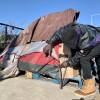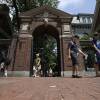Encampments around the area of Melnea Cass Boulevard and Mass Ave, or Mass. and Cass, will no longer be permitted after housing is secured this winter for unsheltered people living in the area, according to Boston Mayor Michelle Wu.
“We will this winter get to a point where there will not be an encampment at Mass. Ave and Melnea Cass Boulevard anymore,” Wu said during a virtual meeting with community members on Monday, “and it will stay that way.”
More Local News
Residents, local business owners and other members of the South End, Newmarket, Roxbury Working Group on Addiction, Recovery, and Homelessness held the meeting to address concerns about the city’s plans for Mass. and Cass, including what many see as a lack of transparency from the city around the ongoing initiative. Plans to temporarily house residents at a nearby hotel sparked concerns that it contradicted the long-sought “decentralization” of area services as a concentration of treatment facilities have emerged in the area and encampments have expanded nearby.
A “temporary cottage community” housing up to 30 people at the Shattuck Hospital campus in Jamaica Plain is still expected to open within the month, Wu said. Plans are also underway to transform the nearby Roundhouse hotel into a Boston Medical Center care center for short-term clinical treatment and 60 low-threshold transitional beds.
Members of Wu’s administration visited the former Long Island shelter campus on Monday to evaluate how it could be used “as part of a medium- to long-term plan,” Wu said, though more immediate shelter options are being prioritized as the weather grows colder.
But residents aired their concerns about the proposals at the meeting Monday.
“We’re frustrated, we’re feeling unsafe, we feel like no one’s listening,” said Yahaira Lopez, an organizer with the South End/Roxbury Community Partnership. “We are continuously hearing political platforms that discuss decentralizing, but then we get initiatives like this that are being built. ... We’re duplicating services, and then we’re constantly wondering why we’re seeing an influx of individuals coming to this location.
“We’re constantly hearing that we have to meet people where they are,” she said. “When are we going to meet the community where we are?”

City Councilor Frank Baker, whose district includes Mass. and Cass, has staunchly opposed the Roundhouse hotel proposal, writing in a letter to Wu earlier this month that because “the deplorable area in and around Mass and Cass is inundated with services,” adding new services and housing nearby would exacerbate public safety issues.
“I do have a problem with this going right into the middle of Mass. and Cass, because the reality is, even if you get somebody healthy in the Roundhouse, the first time they step out of that building, they’re on Mass. and Cass, and they become a target, they become a victim instantly,” Baker said. “Until we bring people away from that area, this will not get any better.”
State Rep. Jon Santiago, an emergency room doctor and former mayoral candidate, emphasized the need to decentralize treatment for people experiencing substance use disorder, adding that the proposals at Roundhouse “do seem very similar” to existing services provided in the area by BMC.
Services at the Roundhouse are designed for short-term stabilization, not long-term care, BMC addiction specialist Dr. Miriam Komaromy said during Monday's meeting.
“This is specifically geared toward trying to help stabilize the most challenging patient population, which is the folks who are in the encampments right now. They’re the ones who have the greatest challenges facing them, and they”re obviously the ones for whom the existing services have not succeeded in helping them to move out of the area,” Komaromy said. “We’ve designed this model with the specific goal of meeting these folks where they are in this neighborhood, and then having a clear plan for how to move them on from here.”
Though BMC services do serve the population at Mass. and Cass, the current service options aren’t working for people experiencing homelessness and substance use disorder in the immediate area, Komaromy said.
“This subset of the population needs more intensive services focused on a combination of substance use disorder and mental illness, as well as tremendous social barriers,” she said. “So we’re setting up this model to help stabilize them and then to help them to move on to permanent housing outside of the Mass. and Cass area.”

Roxbury activist Domingos DaRosa spoke at Monday’s meeting, more than a year after he was issued a stay-away order from Gov. Charlie Baker’s Swampscott home after he and other neighborhood activists brought used needles from the streets of Mass. and Cass to the governor’s yard. It’s a protest that he says reflected years of frustration at not being heard.
“This conversation has been the same, we’ve been talking about the same thing, made tons of suggestions and held countless hours of meetings,” DaRosa said during Monday’s meeting. “We don’t want to keep spinning this wheel. The hamster has gotten so creative that he’s on the outside of the wheel spinning, and now this thing just seems to be the same old spin.”
Promising more details in the coming days, Wu emphasized a “true transformation” of the neighborhood, “not just a return of what is currently there.”
“We want to see a complete change to the experience and the dynamic that you all have been living through for years and years and years,” she said. “We need to see treatment and services available citywide, regionally, statewide so that Boston won’t be bearing the burden of this. And your neighborhoods and our kids and our seniors and everyone, our businesses in the area won't be bearing the burden of this.”
The mayor did not specify whether she will continue the city’s previous strategy of placing eviction notices on tents. “Details are still being worked out” regarding protocol and enforcement for prohibiting tents in the area, she said, promising that a more comprehensive plan will be made public this week.
The first step is to address the safety of the unhoused people currently living outside in freezing temperatures, and then more long-term solutions will follow, Wu said, including involvement from the city’s public works departments to improve the quality of life for residents.
“This is intended to change that dynamic and to do this in a way that addresses the immediate crisis that we are up against with the weather,” Wu said, “as well as laying the foundation for how we transition to a medium- and long-term plan right after that.”










